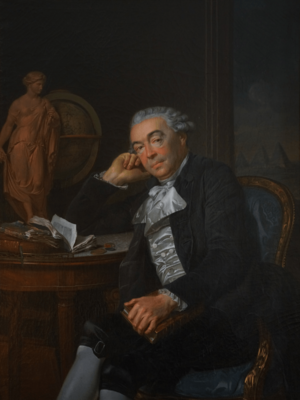João Carlos de Bragança, 2nd Duke of Lafões facts for kids
Quick facts for kids
The Duke of Lafões
|
|
|---|---|

Portrait by Louis Rolland Trinquesse (Palácio do Grilo)
|
|
| Minister Assistant to the Dispatch | |
| In office 6 January 1801 – 21 May 1801 |
|
| Monarch | John, Prince Regent |
| Personal details | |
| Born |
João Carlos de Bragança e Ligne de Sousa Tavares Mascarenhas da Silva
6 March 1719 Lisbon, Portugal |
| Died | 10 November 1806 (aged 87) Lisbon, Portugal |
João Carlos de Bragança e Ligne de Sousa Tavares Mascarenhas da Silva was a very important Portuguese noble and politician. He was known as the 2nd Duke of Lafões. He was born in Lisbon, Portugal, on March 6, 1719, and passed away there on November 10, 1806.
The Duke of Lafões was a top military leader, serving as the marshal general of the Portuguese Army. He even led the army during a conflict called the War of the Oranges. He also helped start the Royal Academy of Sciences in Lisbon. For a short time in 1801, he held a very high government job, similar to a Prime Minister, called "minister assistant to the dispatch." He lost this job when Spanish forces entered Portugal, but he remained a marshal in the army.
Contents
Early Life and Learning
João Carlos studied subjects like history and philosophy. His uncle, King João V, wanted him to become a religious leader. Because of this, João Carlos went to the University of Coimbra to study Church Law.
A Life of Influence
The Duke of Lafões was a very cultured man. He was the son of Pedro II of Portugal's legitimate son. He was a leader who disagreed with the powerful minister Sebastião José de Carvalho e Melo, 1st Marquis of Pombal. While living away from Portugal during Pombal's time in power, he supported famous musicians like Gluck and Mozart.
After Pombal lost his power, the Duke of Lafões became a major public figure. He held important government jobs. He also founded the Royal Academy of Sciences in Lisbon, which was a big achievement.
Travels and Adventures
In May 1757, he left Portugal and traveled to London. In January 1758, he went to Vienna. He left Portugal with the title of Duke, but his exact reason for leaving is not fully known. One idea is that he wanted to suggest a marriage between a Portuguese princess (an Infanta) and the Habsburg emperor Joseph II.
While in England, he became a member of the Royal Society, a famous group for scientists. To reach Vienna, he joined the Austrian army because the Seven Years' War was happening. His uncle, Infante Manuel, Count of Ourém, who was King John V's brother, had been a general there. João Carlos became a high-ranking officer in an infantry regiment. He took part in the final battles of the war.
After the war ended in February 1763, he traveled a lot. He visited Switzerland, Italy, France, and even places in the East like Greece and Egypt. Later, he also visited Prussia and Poland. In 1766, he wanted to rejoin the Austrian army as a major-general, but the Portuguese king did not allow it. In 1770, the composer Gluck dedicated his opera Paride ed Elena to the Duke of Lafões. This showed that the Duke was an expert in mythology and music.
Return to Portugal and New Roles
In 1778, King José I died, and the Marquis of Pombal was removed from government. This allowed João Carlos to return to Portugal. He accepted the title of Duke of Lafões.
In 1779, he worked with the abbot Correia da Serra to found the Academy of Sciences of Lisbon. This important academy started in his home, the Palacio do Grilo. He might have done this to honor his brother, who had suggested such an academy back in 1721.
The Duke continued to take on important roles. In 1780, he joined the Board of War. In 1791, he became the governor of Arms for the Court and the region of Extremadura. He was also made marshal general that same year. In 1789, he became a member of the Order of Christ (Portugal), a very respected order. By 1796, he was part of the Council of State, which advised the king.
Leading in Difficult Times
In January 1801, Portugal faced the threat of war with Spain. Because of this danger, João Carlos was appointed minister assistant to the Prime Minister and Secretary of State for War. When war was officially declared in March, he became the head of the Army. He went to Alentejo, where the main battles of the War of the Oranges were happening. While he was in Abrantes with the army, he received news that he had been removed from his military and political jobs.
 | Jackie Robinson |
 | Jack Johnson |
 | Althea Gibson |
 | Arthur Ashe |
 | Muhammad Ali |

